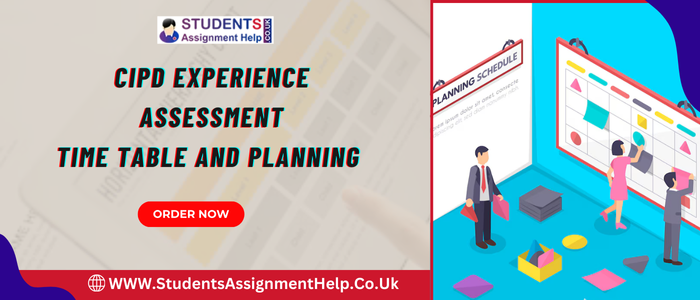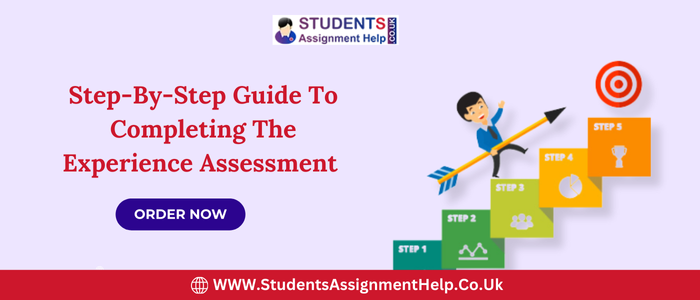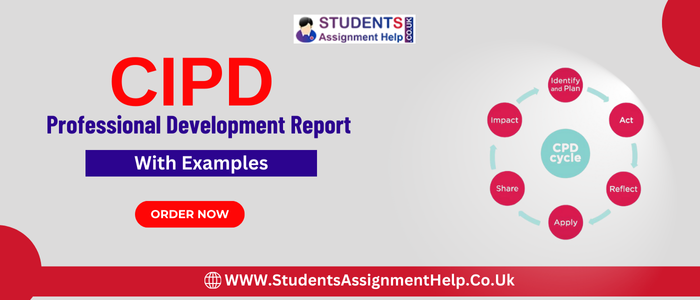CIPD Experience Assessment Timetable and Planning
The Chartered Institute of Personnel and Development (CIPD) provides an assessment process for HR and L&D students to achieve a CIPD professional certificate. It is an excellent pathway for HR and learning professionals. because it provides you with the CIPD qualification based on practical exams. You don’t have to take exams. But this requires careful planning and organization, like a clear timetable and structured approach, etc.
In this blog, we will guide you on how you can make your timetable, break down tasks, and more that can make your journey successful. Let’s dive into how to manage your time effectively and align your experience with CIPD standards for a successful outcome.

What is the CIPD Experience Assessment?
The CIPD Experience Assessment is a way for HR and studying professionals to benefit from CIPD qualifications primarily based on their work experience instead of exams. It involves collecting evidence of your skills, reflecting on your work, and completing responsibilities that display you meet CIPD standards.
Understanding the CIPD Experience Assessment
The Experience Check keeps track of your professional experience against the CIPD Professional Map. This includes:
- Self-assessment: Self-reflection on your knowledge, skills and attitudes.
- Practice-Based Evidence: Providing documentation of business impact.
- Online research tasks: Case studies, written tasks, and video interviews.
The process usually takes 4-6 months, depending on your race and CIPD’s inspection timetable.
Hire an Essay Writer to Write your Complete Essay on Time
info@studentsassignmenthelp.co.uk
Why CIPD Experience Assessment Is Important?
CIPD Experience Assessment is important because it allows one to gain CIPD qualifications who are professional in learning and HR. CIPD qualification is based on their practical work experience rather than exams. Here is the route of achievement that helps professionals:
- Validate Expertise: You get the expertise and recognition of your skills and experience in HR or L&D.
- Career Advancement: It helps advance your career and improves job prospects, Increasing earning potential
- Professional Credibility: It boosts your credibility in the industry by demonstrating that you meet high professional standards.
- Personal Growth: The process encourages self-reflection and helps you identify areas for improvement that support your continuous improvement.
How to Complete the CIPD Experience Assessment: A Step-by-Step Guide
- Familiarize Yourself with the Candidate Guidance: Read the CIPD Experience Assessment Guide before you begin. It explains what is involved, what is being considered, and how long the process takes. Check the criteria for the number of members you are applying for, as these will be used to judge your survey. You can find video guides and helpful questions on the portal.
- Plan Your Time: Experience Assessment have a time limit of eight weeks, so be sure to plan for enough time to complete and submit your appraisal. Set a regular time instead of trying to finish everything at once. All written surveys should take about five days to complete, so plan accordingly. Don’t forget to allow time for colleagues or customers to submit Stakeholder Feedback.
- Set a Date for Your Professional Discussion: Once you have registered, CIPD will contact you to arrange a professional consultation. Usually, this will be through a video link such as Skype or Zoom. You will be contacted within ten business days of booking to arrange this consultation.
- Start Your Assessments: Once you have received confirmation of your registration, you will have eight weeks to submit your Knowledge Impact Report, Behavior Report and Professional Development Report (including stakeholder feedback) Be sure to review the Leader Guide for more information.
- Submit Your Assessments: You can submit your surveys for free within eight weeks. You can’t make changes once you’ve submitted it, so make sure you’re happy with it before you submit it.
- Professional Discussion: A professional consultation will be held three to six weeks after you submit your research. It will be done via video link. Review the guidelines for the candidate group and prepare.
- Your Results and Feedback: You will receive an email when your feedback notice arrives, which will be approximately six weeks after your professional consultation. Be sure to download or print the report within two years.
Consult with British Essay Writers to Write your College Essay
info@studentsassignmenthelp.co.uk
How to Plan and Create a Timetable for the CIPD Experience Assessment
Planning and coping with it slow efficiently is key to efficiently completing the CIPD Experience Assessment. Here’s how you can create an established timetable to guide you via the procedure:
Understand the Process and Requirements
Before you begin, get yourself up to speed with the CIPD standards and the evaluation necessities. This will assist you align your enjoyment with the expectancies and coming up with a clear idea of what’s involved.
Set a Timeline
The assessment is time-restricted to eight weeks, so plan for this reason. Break the procedure into levels, which include:
- Initial Preparation: Allocate 2-3 weeks to collect all the essential substances and understand the assessment tasks.
- Evidence Gathering: Set aside 4-6 weeks to gather painting samples, reports, and documents that reveal your competencies.
- Self-Assessment and Tasks: Dedicate 6-8 weeks to completing reflective tasks and writing up your reviews.
- Final Submission and Review: Plan 2-3 weeks for reviewing and filing your work.
Allocate Weekly Time Blocks
Set apart ordinary time every week to paint for your assessment. This could consist of reviewing substances, writing responses, and accumulating proof. Treat these hours as non-negotiable to keep away from final-minute rushes.
Account for the Professional Discussion
Schedule time in your Professional Discussion, to take 3 to 6 weeks when you submit your assessments. Ensure you’re prepared by reviewing your work and awaiting questions.
Pay to get your assignments done on time
What Are Some Tips for Effective Planning for the CIPD Experience Assessment?
Planning is fundamental to staying on track and efficiently finishing your CIPD Experience Assessment. Here are a few easy and effective guidelines to help you plan your time and obligations:
Set Clear Goals (SMART Goals)
Break down your evaluation obligations into particular, clean goals. Make sure every intention is:
- Specific: Know exactly what you want to do.
- Measurable: Be capable of song your progress.
- Achievable: Set dreams which are practical within your time frame.
- Relevant: Ensure each aim is aligned with the CIPD necessities.
- Time-certain: Give every goal a cut-off date to live centred.
Use Planning Tools
Stay on top of your tasks and deadlines with a planner, calendar, or digital tools like Trello or Asana. These tools help you organize your work, set reminders, and make sure you don’t miss any time you use them. You can make large tasks smaller and more manageable, making everything less complicated.
Seek Support
Don’t be afraid to ask for help. Talk to mentors, colleagues, or CIPD experts who can provide information and advice. Having someone review your work can help improve it before the final review.
Regularly Review Your Progress
Take some time each week to review your progress. Look at what you’ve already done and see if it matches your goals. If you are running late or need more time for certain tasks, adjust your schedule. Regular check-ins help you stay organized and avoid last-minute rushes.
First Time Customer! Get 15% off on Assignments
Use Promo Code "SAH15"
CIPD Experience Assessment Timetable
Here is the Assessment timetable you can check and get an idea for your CIPD experience assessment timetable and planning.
| Stage | Duration | Activities | Deadline |
| 1. Initial Preparation | 2-3 weeks | – Review the CIPD Profession Map and assessment guidance. – Understand the standards and requirements. | Week 1-3 |
| 2. Evidence Gathering | 4-6 weeks | – Collect work samples, reports, and documents. – Align evidence with CIPD criteria. | Week 4-9 |
| 3. Self-Assessment & Tasks | 6-8 weeks | – Complete reflective self-assessment. – Write up reports (Knowledge & Impact, Behaviour, etc.). | Week 10-17 |
| 4. Final Submission & Review | 2-3 weeks | – Review and finalize your reports. – Submit your assessments. – Prepare for the Professional Discussion. | Week 18-20 |
| 5. Professional Discussion | 3-6 weeks after submission | – Schedule and prepare for the Professional Discussion. – Review all materials for the discussion. | Week 21-25 |
| 6. Results & Feedback | 6 weeks after the discussion | – Receive and review your feedback report. – Download/print your report. | Week 26-30 |
Weekly breakdown:
Weeks 1-3: Focus on introducing the research plan, gathering priorities, and understanding expectations.
Weeks 4-9: Spend time gathering and organizing your evidence. Make sure everything meets CIPD standards.
Weeks 10-17: Work on reflective self-assessments and complete all written assignments. Take time to review your answers.
Week 18-20: Complete your reports, double-check your work, and make sure all items are ready to ship. Start preparing for business interviews.
Week 21-25: Plan and prepare for your job interview. Be prepared to share your report and experience in detail.
Weeks 26-30: After your conversation, review what you said and make sure you have a hard copy of the report.
Still thinking, See our best assignment deals Now!
Challenges and How to Overcome Them
Time constraints, evidence alignment, and self-reflection are commonplace demanding situations in the CIPD Experience Assessment. Managing those demanding situations requires powerful plans, clean organization, and honest self-evaluation to ensure fulfilment.
- Time Constraints: Break responsibilities into smaller steps and set clean cut-off dates for each segment of the procedure. Use tools like calendars or task control apps to live prepared and prioritize tasks primarily based on urgency.
- Evidence Alignment: Cross-take a look at your proof with CIPD standards to make certain relevance. Select examples that at once show off your talents, and use the STAR Method to shape your evidence.
- Self-Reflection: Be honest and exact in assessing your capabilities and achievements. Focus on precise times when you have established the required capabilities and back them up with concrete examples of your work.
Ready to Plan Your CIPD Experience Assessment?
At studentsassignmenthelp.co.uk, we’re right here to help you navigate the CIPD Experience Assessment procedure comfortably. Whether you need assistance with making plans, amassing proof, or getting ready for your professional discussion, our professionals are equipped to guide you each step of the way.
Get in contact with us today to create your personalised timetable, stay on the right track, and make sure you hit the final results of your CIPD evaluation. Let us assist you attain your CIPD qualification by offering you the best CIPD assignment help in the UK and take your HR profession to the subsequent stage!























